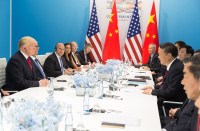Just over a month after Canada unlawfully detained the CFO of the Chinese tech giant Huawei on orders from the US, it has been announced that Poland has arrested one Chinese national in Poland who works for Huawei, an individual called Wang Weijing as well as a former senior intelligence officer from Poland. China’s government has demanded that all of the details of the matter concerning Wang’s detention be handed to the Chinese Embassy in Warsaw with the utmost urgency. While Huawai later terminated Wang’s employment, this still leaves more questions than answers.
At the same time, while China’s government and the wider world await information from Poland on this matter, inferential reasoning leads one to conclude that just as the US forced its Canadian ally to detain Huawei’s CFO for matters that had nothing to do with Canada, so too may the US have asked a similar “favour” of its Polish ally.
Of course, Donald Trump and Poland’s centre-right Prime Minister Mateusz Morawiecki as well as Poland’s President Andrzej Duda, have a highly productive working relationship between each other. On the one hand, Poland’s ruling Law and Justice party has been a major factor in opposing the European integrationism of Trump’s apparent nemesis Angela Merkel, while on the other hand, Poland provides a geographically useful and politically wiling partner in America’s neo-Cold War against Russia.
But while Poland is all too happy to join in with America’s anti-Russian stance in Europe, just because China and Russia are allies - this should not lead Poland to think that treating China in the same way as Russia will automatically lead to the same results.
At the moment, Poland is among the leading nations in the Three Seas Initiative which is a sub-European Union bloc that also includes, Australia, Bulgaria, Croatia, Estonia, Hungary, Latvia, Lithuania, Romania, Slovakia and Slovenia. It has been noted that while still in its early days, the Three Seas could represent a potentially crucial element of China’s Belt and Road connectivity initiative as the countries in the Three Seas include those on the eastern and southern frontiers of Europe that converge with Belt and Road connectivity projects in Turkey, Russia and the wider Eurasian space.
Because of this, and because Poland does not have a specifically antagonistic relationship with China in the way that it does with neighbouring Russia, it would make absolutely zero sense either at a practical nor at an emotional level for Poland to seemingly randomly arrest a Chinese national working for a company that could potentially revolutionise mobile data in Poland. Therefore, one can logically deduce that either someone in Warsaw actually believes Wang is spying on Poland or else, a far more likely explanation is that Warsaw danced to the American tune as it has been inclined to do since the 1990s.
But while the idea of a US-Russia war in central Europe is little more than a pantomime threat in a year that will see the 30th anniversary of the fall of the Berlin Wall, as China’s current investments in Poland aren’t as substantial as for example Chinese investments in neighbouring Pakistan are, should China feel that its citizens are unsafe from random abuse at the hands of the Polish authorities, it would be all too easy for China to pick up and walk away from Poland if pushed to such a position.
While China helping Poland to modernise its mobile networks is clearly a win-win scenario, were Poland to antagonise China, the stakes for Beijing would be so comparatively low that it would become a lopsided lose-lose to the detriment of Polish mobile and broadband users should China decide to quit the country in respect of digital connectivity cooperation.
While Russia, has long been a customer for Polish agriculture, a sector that has been hit by the 2014 era EU sanctions on Russia, many in both Moscow and Warsaw are resigned to the fact that Russo-Polish relations will be inexorably strained for the foreseeable future. Yet because of the expansive distance between Poland and China, there is no reason why anything but win-win relations should exist between a growing economy in central Europe and the world’s most dynamic economic superpower.
It is therefore in Poland’s interest not to fall into the trap that Canada has fallen into by needlessly antagonising China and harming a Chinese citizen for no self-interested gain. While the US dictating Polish policies towards Russia is more often than not a matter of preaching to the converted, when it comes to antagonising China, Poland has nothing to gain and potentially a lot to lose by treating China in the way that Russia tends to be treated by America’s closest European partners.




